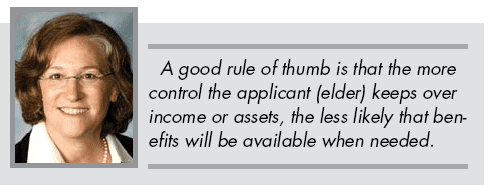Qualifying for Medicaid – What Families Need to Know About What Dictates Eligibility
One of the greatest assets that attorneys experienced with elder and estate planning, as well as asset protection planning (sometimes referred to as Medicaid planning) can offer to clients is proficiency with the rules and regulations that dictate eligibility for various programs, as well as honesty with clients and their families. While counsel can know the current techniques to assist clients to qualify for MassHealth benefits, whether for long-term care (skilled nursing home) needs, or community based services (for example: home and community based waivers or personal care attendant programs), as the associated costs for these medical-related services continue to escalate, and available state and/or federal funds continue to constrict, the rules continue to change.
Even where the text of the rules and regulations do not change, interpretations or decisions under those rules seem to continually narrow and modulate. Because attorneys can only provide advice based upon the law in effect at the moment, certain techniques recommended today may not be given the same interpretation a few years from now. You will find below some planning concepts that continue to work and also what to avoid right now.

A good rule of thumb is that the more control the applicant (elder) keeps over income or assets, the less likely that benefits will be available when needed. The less retained control, the greater the likelihood of qualifying for benefits. Think of it as the see-saw that your kids played on. On one side is control, and on the other is the ability to qualify for benefits. Both will not happen concurrently. If your elderly loved one accepts that early on, creating and implementing a proper plan should go more smoothly.
In many cases, time is still on your side though. The sooner your family considers and acts on a plan (whether it involves asset transfers, repositioning of assets and/or income, or simply sparks discussions as to whether your elderly loved one might be best served in the community or in a long-term nursing home situation), the better the chances that the intended plan might survive long term. Where the current look-back period is five years, we continue to hear grumblings that longer look-back periods are being considered (whether seven or 10 years). Therefore, while you don’t need to panic and rush to counsel, where age or a decline in health starts to bring about concerns, seek a consultation with counsel who is experienced in this area.
Properly drafted written contracts made in advance of services being provided that allow for family members to provide care to or for an elder may be allowed and should survive being cast as a disqualifying transfer. Similar to care-giving provided by a professional agency, even private, family-based care should be based on keeping contemporaneous log books of what services are actually performed, how the elder is doing, and hours worked. They should also identify the provider of the services, and provide timely billing using formal bills.
Despite the fact that family members frequently give up careers where hourly rates command compensation of $50 to $75 or more per hour, those hourly rates will not be accepted by MassHealth if the care only requires the skill set of a certified nursing assistant, or that equivalent. This will result in MassHealth considering the payment (or at least the excess payment) a disqualifying transfer.
If care is provided by a family member as an independent contractor, as opposed to going through an agency, do not charge the same hourly rate as a care-giving agency. An agency generally engages certified or licensed care-givers, and also have administrative and overhead costs, etc. An individual who provides services as an independent contractor and is not hired through an agency, can generally charge between $12 and $15 per hour, depending upon where the services are performed. Check with your local elder services agency to compare hourly rates paid in your local community. While not determinative, remember to report the income for income tax purposes. It further supports the intention that the funds were being paid as “income,” and not gifts.
If your elderly loved one moves in with you, fair market rent can be paid. Again, a written contract signed by the elder in advance of the rent being paid is the best approach. Also, the rent should be reflective of the fair market value for the space made available. A one-bedroom apartment with a separate kitchen, bathroom, and entrance/s, should allow for greater rent than a room in a home, which does not have all of the attributes of a “separate apartment,” even if food and/or heat is provided.
The purchase of an annuity for the elder has its place as a planning tool, but if it is only being considered for asset-protection purposes, there is no need to immediately rush out to purchase one. As a spend-down or planning tool this can usually be purchased within the five-year look-back period, and even on the eve of submitting a MassHealth application. Before purchasing the product though, be sure to talk to counsel experienced with MassHealth as to whether this is really purposeful.
As for use of trusts as a MassHealth planning tool, a revocable (changeable) trust created by the elder will not help him or her to qualify for MassHealth. If feasible, avoid situations where the elder is a beneficiary of a trust. But if the elder is a beneficiary of a trust, consider the following:
Is there sufficient time for the elder to disclaim (give up) a problematic interest in the trust?;
Only allow the elder access to income, and conversely, do not allow access to principal, whether mandatory or discretionary; and
Know that if there are securities (stocks, mutual funds, etc.) owned by the trust, MassHealth might try to insist that they be invested to maximize income to the elder, and therefore minimize growth for the ultimate beneficiaries (i.e., remaindermen).
Community based services might also be a viable option, especially where 24/7 care might not be required. In fact, services can even be made available in your loved one’s home. Not all programs are available in every community. And for some of the community-based options, the five-year look back period does not apply.
Irrespective of the planning actions taken, the final, and maybe most important recommendation is this: payments or transfers made to family members may come into questions if paid within five years of the elder’s application for MassHealth benefits. The recipient should be cautioned to avoid spending the money, unless there is a back-up plan in place to repay it, if needed. Once the elderly loved one is fully approved for MassHealth benefits, then by all means, enjoy the funds that were transferred.
Consult with a MassHealth or Medicaid planning professional to learn more about how MassHealth works and specific planning options that might benefit your family’s situation.
Lisa L. Halbert, Esq. is an associate in the Northampton office of Bacon & Wilson, P.C. A member of the estate planning, elder, and real estate departments, she is especially focused on legal matters relating to elder and estate planning, and asset protection; (413) 584-1287; baconwilson.com/


